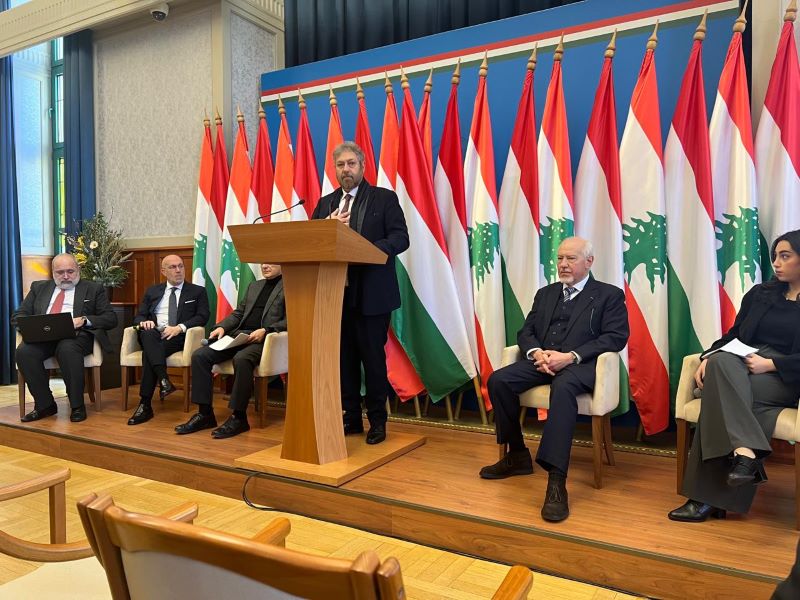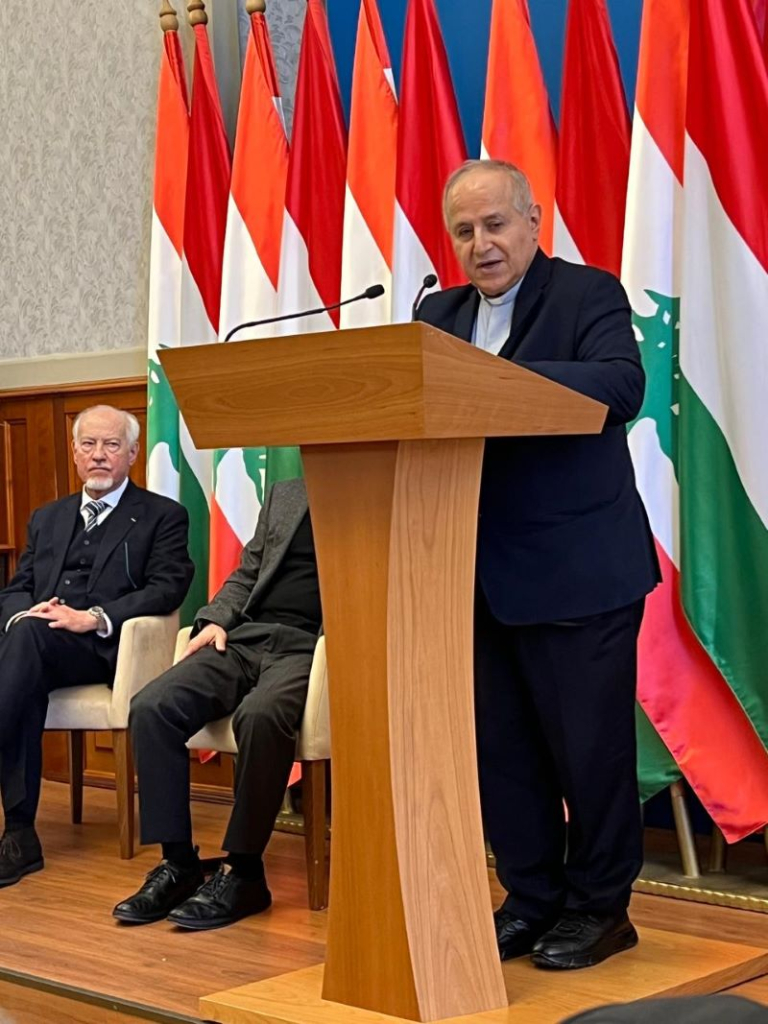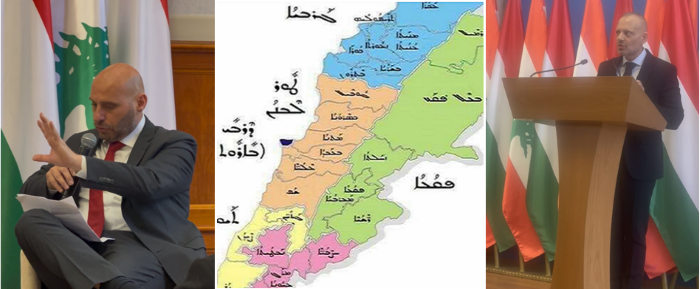The Future of Lebanon from a Christian Perspective Conference: FedLeb and USUP make a strong case for federalism
BUDAPEST, Hungary – The conference “The Future of Lebanon from a Christian Perspective” was held this Friday in the Hungarian capital. Hungarian Minister of Foreign Affairs and Trade Péter Szijjártó kicked off the conference by announcing the Hungarian contribution in the form of a monetary fund in support of the Christians of Lebanon. It is intended to create programs that keep Christians in Lebanon, create jobs, and it would support education, and medical and religious centers. The fund structure and board members will be organized and appointed in a follow-up meeting to be held in the coming months.
Participants to the conference included Lebanese MP’s, political parties such as the Kataeb Party (Samy and Nadim Gemayel), Lebanese Forces Party, Free Patriotic Movement, and the Universal Syriac Union Party (represented by Amine Iskandar), federalism advocacy organizations such as the Continual Federal Congress (Alfred Riachi) and Federal Lebanon (Iyad Boustany), academics, and representatives of media and NGO’s. Syriac Member of Swedish Parliament Yusuf Aydin also attended.

The Syriac Maronite Patriarch Cardinal Mar Bechara Boutros Rai was in Budapest for the conference but could not address the opening session due to a mild cold. His representative Bishop Mor Paul Sayyah read the patriarch’s speech in which the government of Hungary was commended for the initiative to convey the much-needed conference because the crises that Lebanon faces are many. The Patriarch stressed that its proximity to the troubles in Syria, Palestine and Israel, prompts young Christians to emigrate in search of a better future elsewhere.
The Patriarch added that the conference and its outcomes can help Christians remain in their homeland, which should be the goal not only for Lebanon, but for the whole Middle East. Lebanon, due to its diverse society, is a model of coexistence and can play a role in establishing peace and dialogue in the region. Mar Bechara quoted the late Pope Paul II that Lebanon is not only a country, but also a message.

No Christian Culture Without an Own Country
Iyad Boustani of Federal Lebanon recalled the long legacy of relations between Hungary and Lebanon that began almost 200 years ago when the prime minister of the Austro-Habsburg Empire drafted Lebanon’s first constitution. And so again with the successful constitution of 1861.
When asked what the proposed Hungarian monetary fund should look like, federalist Boustany has only one answer: it should have a clear purpose and associated principles.
“We are dying. In 20 to 30 years there will be no significant presence of Christians in Lebanon. If this really happens, a legacy of 6,000 years of Phoenician, 2,000 years of Christian and 1,600 years of Syriac Maronite history will come to an end.”
“We want to survive, and we will have to do everything to do so. Just throwing money at the problem is not the solution. For me, the problem is that the constitutional centralized structure of 1926 does not fit the social structure of the country. Lebanon is a multinational and multicultural country. The current constitutional structure kills any non-dominant minority. The only way to solve that is through a federal constitution. This would enable the different components of the country to obtain their own livelihood, no longer feel alienated in their own country, and do not have to falsify their identity.”
Boustany quotes Pope John II: culture first. There is no country without culture, and no culture without country. Christianity simply cannot survive in a framework outside its own civilization.
In his concluding words on the proposed Hungarian monetary fund:
“It must have a clear mission statement. This fund should be dedicated to the direction of a cause-objective that every beneficiary of the funds must adhere to. Christians of Lebanon need a (political) project and a cause. They can no longer allow to have no direction, otherwise they will fade from history.”
For Boustany, the only direction is a federal Lebanon.
Universal Syriac Union Party: Geo-Cultural Federalism
The conference was organized in talks and panels. In the ‘political views’ section Amine Iskandar, representing the Universal Syriac Union Party’s President, Ibrahim Mrad, delivered a speech analyzing the challenges facing Lebanon’s Christian community. The speech painted a picture of systemic marginalization, historical struggles, and a roadmap to safeguard Christian identity through federalism.
From the beginning of Greater Lebanon, in the 1920s, the Lebanese entity has faced rejection from various parties that considered it a mere artificial entity that does not conform to the vision of the “umma” or the project of the “Greater Arab State”. From the beginning persecutions happened and Christians witnessed repeated massacres and continuous attempts to weaken their presence causing Lebanon’s demographic balance to change.
The imposition of the 1989 Taif Agreement turned the country into an “Arab” country and reduced the political power of Christians in the state. Amine Iskandar stressed that the current lack of demographic balance, between Christians and Muslims has become impossible to reverse, and has become the primary weapon used by Islamists to threaten the Christian presence.
Iskandar pointed out that Christians made mistakes in Lebanon, as they sought acceptance in their surroundings by abandoning their Syriac language, their history, their historical allies, and sometimes their identity, stressing that this denial of their roots, allies, and reality only led to their weakening in a more dangerous way.
In his final remarks, he stressed that the only way to confront these plans is to move to geo-cultural federalism, which gives diversity its right without conflicting with coexistence.
Concrete plans
The proponents of the federal system have proposed to the conference organizers that each The proponents of the federal system have proposed to the conference organizers that each delegation, the next time they meet, come up with a concrete political project and submit a corresponding plan. A committee will then analyze the projects and adopt one official vision and mission statement for which money will be raised and allocated in the monetary fund.
My quick takeaways from the February 27 2025 Budapest conference:
1. The dominant political parties (FL, CPL, Kataeb) came in, lectured everybody with «feel good » platitudes and left without proposing anything. Not even a piece of paper.
1/n— Don ܐܝܐܕ ܒܣܬܐܢܝ (@heraldgardner) March 1, 2025























